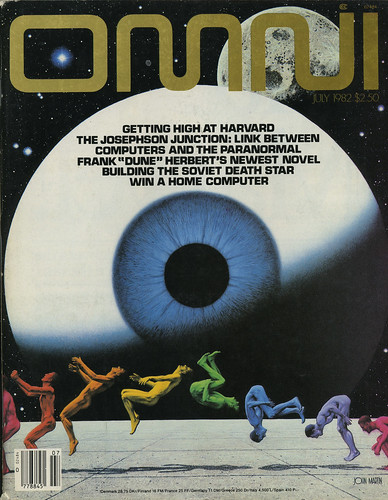 |
| Cover of Omni's July 1982 issue. |
A while back, I outlined some of the wildly incorrect predicted 2010 prices from 1980's The Omni Future Almanac. Today, I want to point out some things the Omni editors got right.
And, because it's funnier, some more stuff they got wrong.
Successes
First, a couple slam dunks. On page 206, the editors wrote that video recording technology (initially the VCR) would not only let people watch what they want, when they wanted it, but that the practice would drive programmers and ad people crazy. They even got the terminology right:
The use of home video recorders for this type of "time shifting" will cause major problems for broadcasters who must predict to their advertisers which market will be watching which program at a specific time. Fans of daytime television programs, for example, will watch soap operas when their schedules permit — probably in prime time — utterly skewing ratings and confusing advertising plans.
Another swish -- e-mail would quickly become a communications medium to be reckoned with. While it sings the praises of the yet-to-come “paperless office” Omni's Almanac also (on page 181) talks about the amazing new technology of “electronic mail.” Apparently, in this miracle technology:
Messages are typed into the computer, which instantaneously sends the letter to its destination and files all requested copies. The recipient gets the message — either on his screen or through his printer — when he asks his computer for the mail.
E-mail was predicted to be common in interoffice business by 1990 and most correspondence would be e-mail (though that term wasn’t used by Omni) by the year 2000. The book also said the post office would struggle to compete. That much is true.
Mixed bags
On some matters, Omni had a mixed track record. Take health care costs. Omni predicted (on page 157) that an average familiy's health care costs would drop from 10.1 percent of a family's income in 1980 to about eight percent in 2000. Well, three failed decades of health care policy later, A middle-income family with individual coverage spends on average 22 percent of household income on health care -- and some spend up to 50 percent. A similar middle-income family with employer based coverage spends 8 percent percent of their income on health care costs.
In business, Omni suggested that General Motors would be profitable for many years thanks to fuel cell technology in its vehicles, ”but by 2010 the Detroit giant could vanish from the leading ranks of corporate conglomeration” (p. 178). Well, they got that last part right (still waiting on the fuel cells).
In the wishful thinking department, Omni's predicted the success of Genentech, still based on a sprawling South San Francisco campus but recently acquired by Roche. Of course, Omni also said that Genentech and or Cetus (another biotech company bought by Chiron in 1991 after staggering loses) “will create pharmaceuticals that will effectively cure diabetes and suppress the cancer tendencies in smokers.” Say what?
Just plain wrong
While Omni got some things right, or at least right to a degree, it was very off in other areas. Take basic economics. The magazine's editor thought that the average amount of their income spent by an American family on housing would drop from 21.3 percent in 1980 to about 19 percent in 2000. Well, in 2009, the average US family spent about 34 percent of their income on housing. (I blame the torrid San Francisco housing market!).
Of course, no discussion about the "future" is complete without a section on robots. On page 178, the Future Almanac predicts that the Soviet Union "will standardize the robots industry." Widespread use of robots would give the proletariat workers more free time and thus result in more political tension. Nothing about the Berlin Wall falling, however.
In the United States, Omni predicted, robots will be used extensively in office, service industries and manufacturing. Occupations which would become obsolete include bank tellers, supermarket cashiers, "movie ticket operators," car wash workers and stock clerks. "Factory assembly lines will be a nostalgic reminder of the past." Tell that to the population of Flint.
Another interesting area would be the use of robots in the restaurant business:
Short-order food preparation also appears likely to be overtaken by robotics. These firms could implement a robot food-serving system as early as 1985. Gas stations will also be totally serviced by robots. While the tank is being filled, a credit card will be put into the machine to register payment and complete the transaction.
That sounds like this:
 |
| Courtesy: The Fiscal Times |
Omni predicted widespread use of robots only among the wealthy and upper middle class, however. That's probably why you don't have one. Except maybe a Roomba.
I was going to give Omni credit for its prescience in saying that robot space probes would be very successful -- until the book said that robot space probes would probe "other solar systems." No robot will make it to another solar system in the next 10,000 years, barring breakthrough in warp drive.
Still, we should be glad that robots aren't quite as widespread as Omni thought they would be:

1 comment:
Yikes! Is that McRobot a real thing? What's in the bag? McHuman Burgers!?
Post a Comment